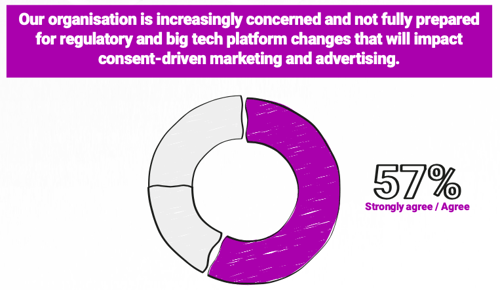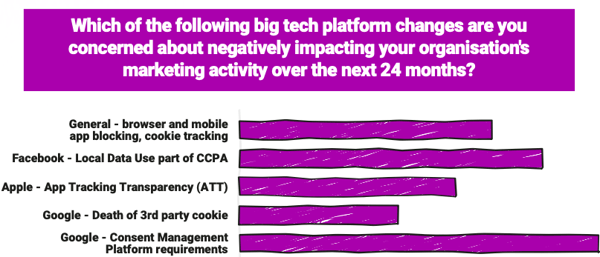The death of the third-party cookie has been coming for some time, and the expectation is that Google will block cookies on Chrome by the end of 2024.
Alongside this, marketers are facing a range of issues around data legislation, and changes made by other big tech platforms including Apple and Facebook.
Using data from LXA's State of Data Privacy and Trust 2023 report, produced in association with OneTrust, we look at how marketers view tech platform changes such as policies around cookies, and in-app tracking.
Not all organisations are confident that they are in a position to cope with these platform changes which have major implications for their marketing and advertising strategies.

From early 2024, Google will begin blocking third-party cookies on Chrome, albeit for just 1% of users, and the plan is to phase them out completely by the end of the year.
With Google commanding a 63.5% share of the worldwide browser market, the removal of third-party cookies from Google Chrome is a huge potential issue for marketers.
However, our survey data suggests that this isn't the biggest item on many marketers' agenda.

Instead, respondents were most concerned about Google’s Consent Management Platform (CMP) requirements, introduced in May. The new rules mean that businesses running ads on Google AdSense, Ad Manager, or AdMob in Europe and the UK are required to have a consent signal from a Google-certified consent management platform (CMP).
The second biggest issue was Facebook’s Limited Data Use mechanism, which limits the use of data from California residents to help ensure compliance with CCPA, and can negatively affect Facebook ad performance.
The relatively low levels of concern about the impending loss of third-party cookies may be explained by marketers taking a ‘wait and see’ approach.
In the absence of clear decisions about how to handle the decline of the cookie, many marketers may prefer to see what the industry as a whole does to deal with this challenge before acting themselves.
Another possible reason is that the repeated delays from Google over its decision to phase out cookies from Chrome has encouraged marketers to kick the can down the road. With Google yet to set a definite date for the blocking of cookies, this is understandable.
Browsers including Safari and Firefox have blocked third-party cookies by default for some time, but Google had originally planned to phase out cookies in 2022.
It then extended this to 2023 and has since announced that it will begin to phase out third-party cookies in ‘the second half of 2024’ as it works on its Privacy Sandbox alternative.
With the removal of third-party cookies set to massively disrupt established practices, a wait-and-see approach may be one many organisations will come to regret.
Instead of waiting, organisations should be proactively preparing for the decline of third-party cookies, shifting toward a first-party data approach, evaluating the potential impact on targeting capabilities, and developing contingency plans.
The death of third-party cookies is perhaps the biggest challenge marketers will face this decade, and certainly the most significant since the introduction of data privacy legislation like GDPR. It's an issue marketers cannot afford to ignore.
LXA's new State of Data Privacy and Trust in Marketing 2023 report looks in greater detail at how marketers handle data privacy and compliance, the benefits of improved data management, and the technology that enables organisations to manage data more effectively.
